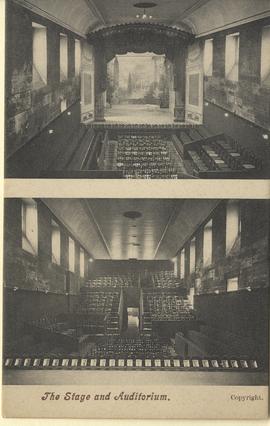An adaptation of the 19th Century German fairy tale by Wilhelm Hauff. The narrative is set in the Middle East and follows Little Muck, who is forced to leave his home after his father dies. Out of desperation, he agrees to care for a woman's many cats in exchange for food and lodging. But he grows dissatisfied and manages to escape his enslavement by stealing her magic slippers and magic cane. The slippers enable the wearer to run extremely fast, and the cane leads its owner to buried treasure. Little Muck enters the service of the king as a messenger, after he wins a race against the king's fastest runner. Rising so high in the king's favour, however, causes the king's loyal advisors to turn against Little Muck. Little Muck discovers some buried treasure in the king's garden, and attempts to buy the friendship of the king's advisors. The king grows suspicious of Little Muck's newfound wealth and he is thrown into prison for stealing from the Treasury. In order to avoid being executed, Little Muck confesses to the magic of the slippers and cane. The king confiscates these, and banishes Little Muck from the kingdom. While the exiled Little Muck is roaming the wild forests, he stumbles across some magic figs which give an enormous nose and ears to anyone who eats them. Seizing the opportunity for revenge, Little Muck adopts a disguise and brings a basket of the magic figs to the king's court, who all partake of the figs. When they realise what has happened, the king begs Little Muck to restore them to normal, but Little Muck refuses and, taking his slippers and cane with him, disappears out of the window.
Lists pupils, masters and ushers. Final year scholars are listed by full names and election details given. Other pupils are divided by form and listed largely by surname only.
Taken from the Journal of the Royal Institute of British Architects, Ashburnham House
Sirr, HarryOne copy annotated on reverse by R.S. Chalk, as follows:
'The sudden transformation of half of Dormitory into Stage & Auditorium mid-way thro’ Play Term was an amazing annual feat. (I have never fathomed where such a vast amount of gear was stored meanwhile). Under Elections migrated up Saignes, Upper Elections occupying their Houses. Combined with a ceaseless round of rehearsals, the dislocation caused to study and routine was immense, but also K.SS would never have it otherwise, regarding the Latin Play (with strictly Elizabethan pronunciation) as our bounden duty to our Royal Foundress. (What of KSS today??)
The fire-hazard in the Auditorium was immense. The whole structure was made out of wood and the only exit the narrow gangway (shown) beneath the ‘Gods’! There was one fireman on duty, he long superannuated.
Since almost the beginning of the century, the Play cycle had settled into a fixed Terentian tetralogy- Andria, Adelphi (1919, post War), Phormio and (euphemistic) ‘Famulus’ (olim Eunuchus)- produced on rigid lines by the meticulous Rev. GGS Raynor. Scenery certainly and costumes presumably (including those extraordinary ‘fleshings’ for limbs) dated from the previous Century. I acted Gera in ‘Adelphi’ of 1923, very capably produced by Rev. H.K Luce'
A circular bowl, the body half fluted, the upper part decorated with swags, engraved "Presented by R T Squire, President of the Elizabethan Club 1955" UNLOCATED - detail appears on Sotheby Valuation of 13 July 1981 and Spink & Son valuation of 28 Feb 1979. Unlocated.
Taylor, Joseph, 1767-1827